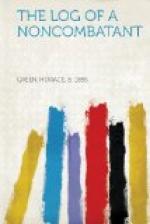Eight days after the Antwerp bombardment, I left The Hague for my second trip into Germany.
Just before my start Captain Sunderland, U.S.A., at the head of the American Relief Committee at The Hague, asked me to help him in taking charge of two carloads of grain, which were to go across the German border and be distributed among the starving Belgians at Liege. England had agreed not to interfere with food supplies, provided the United States saw that they did not fall into German hands in Belgium. The present job required sleeping in the freight cars and saying, in one form or another, “Hands off!” to every spiked helmet that tried to interfere. Captain Sunderland could speak no German, and as I had already been over the same territory and had had some experience with the military authorities, he wished me to accompany him.
I decided, however, to go into the interior of Germany. I had already seen three armies in the field, and had watched, more or less closely, the people of two warring nations. I was now particularly anxious to study the German point of view, and if possible get to the front with the Crown Prince’s army.
For such a purpose I considered that I carried good enough credentials. In addition to a packet of mail for Ambassador Gerard, my letter from ex-President Roosevelt, and my United States passport, which had been vised by Herr von Mueller, German Ambassador at The Hague, I now carried a special laissez-passer which Mr. Marshall Langhorne had been kind enough to secure for me from the same legation. I had a letter from Count von Bernstorff, whom I had seen the night he arrived in America, and a letter from Herr von Biel, Secretary of the German Embassy at The Hague, recommending me to the Foreign Office in Berlin. Professor Hugo Munsterberg had taken the trouble to send me a note to Dr. R. W. Drechsler, head of the American Institute in Berlin, and I had also a letter to the head of the University of Berlin.
It was a five-hours’ run from The Hague to Bentheim, a small country village on the German frontier. The train stopped a quarter of a mile north of the border. Dutch officials came aboard to examine passports and baggage of every passenger. They were good-natured and talkative, and did not go minutely into details, as those leaving the country were less carefully watched than “immigrants.” Me, however, they mistook for an Englishman (as was usually the case in Germany) and told me I could not cross the frontier. A Dutch manufacturer, with whom I had struck up an acquaintance, explained my identity, and the official, who looked astonished, waved me ahead with a doubtful expression, as much as to say, “On your own head be it, young man.”
That first night passed without trouble. At the border station we lined up, immigrant fashion, and went through an inspection by a number of the businesslike German militariat attached to the Zollamt, or customs service. For ten minutes I stood in suspense while a fiery-looking officer, with a snapping blue eye, looked through my credentials in silence. He wrote my name in a notebook, looked through my eye as if he would read my very soul, and then, without a remark, passed me on. I filed through a narrow gate—and so into the Realms of the Kaiser.




